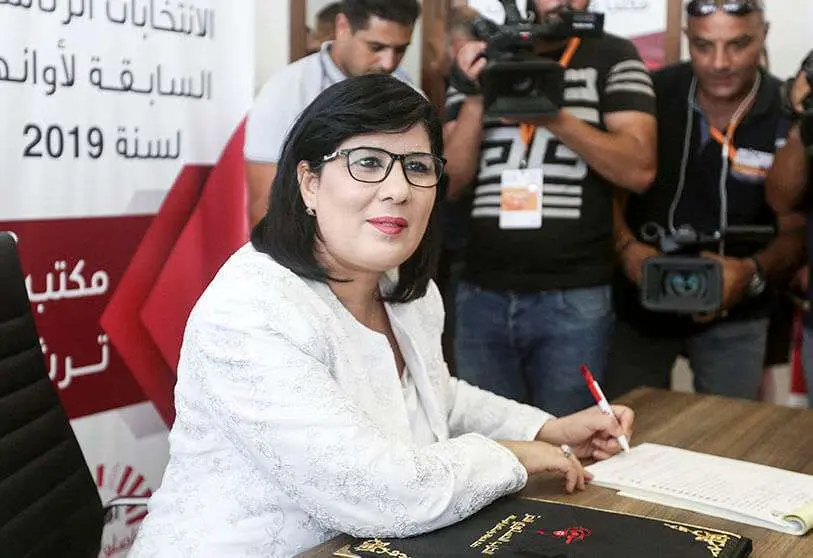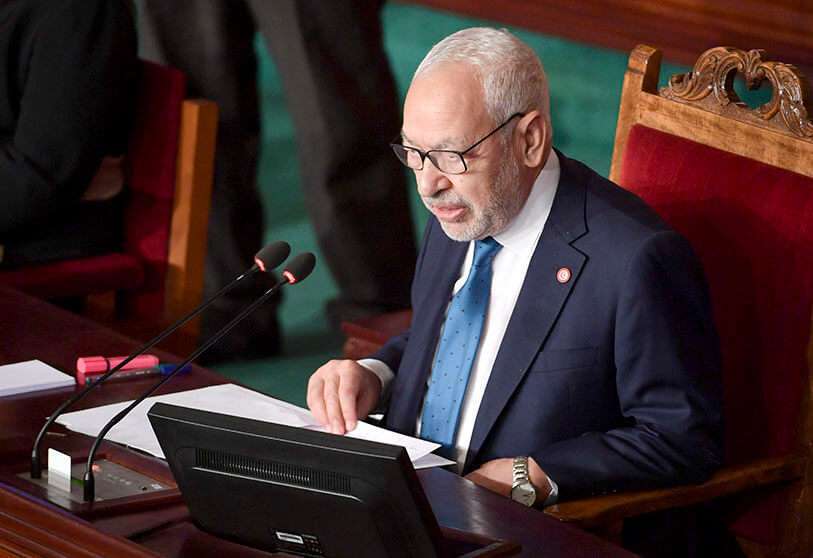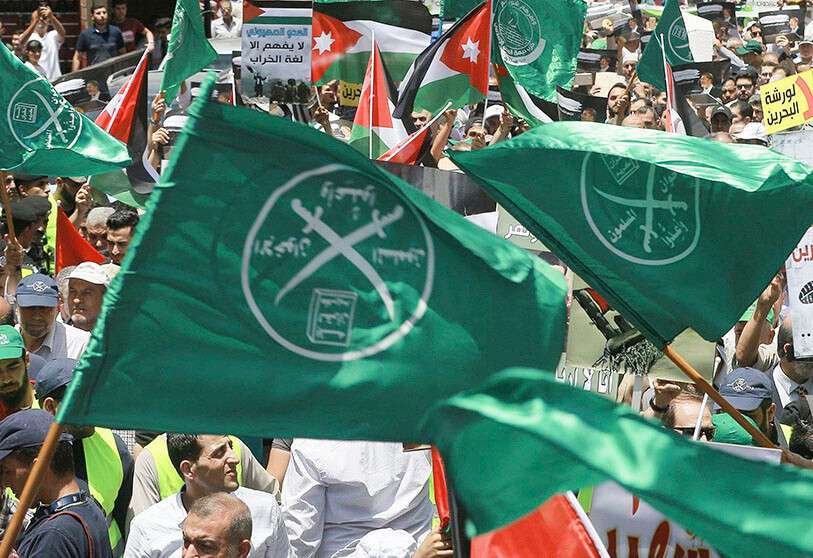Tunisian Abir Moussi promotes classifying the Muslim Brotherhood as a terrorist organization

Abir Moussi, leader of the Free Destourian Party (PDL), announced her parliamentary bloc's decision to submit a new draft resolution to classify the Muslim Brotherhood as "a terrorist organization" and a movement considered "hostile to the civil state," she said at a press conference at the Tunisian Assembly of People's Representatives. This is a move that would again pit the anti-Islamist formation against the Ennahda party and its leader, the president of the Assembly of People's Representatives himself, Rached Ghannouchi.
The PDL leader urged the government to carry out this classification officially. She also called for the prosecution of any Tunisian natural or legal person with links to this organisation, referring to the anti-terrorist law adopted in 2015. "When I consult Ennahda's proclamations calling for Islamist loyalty to the doctrine of the Muslim Brotherhood, we see that it is time for us to submit a draft motion classifying the Muslim Brotherhood as a terrorist organization," said Abir Moussi.
Similarly, the PDL called for the withdrawal of the confidence of the President of Parliament, Rached Ghannouchi, for having exceeded his parliamentary prerogatives and aligned himself with a single side in the war in Libya and not having resorted to a firm position of diplomatic neutrality, for which Tunisia has always advocated.

The struggle continues between these two political movements, the Islamist Ennahda and the anti-Islamist PDL, for dominating the political scene in the North African country. On the one hand, with the support from Turkey, Qatar and the Muslim Brotherhood for Rached Ghannouchi's movement; and on the other hand, from the other side of Islam in Saudi Arabia, the United Arab Emirates and Egypt for the opposition embodied in Moussi's political formation. Confrontation that has become more acute in Tunisia as a result of the war in neighbouring Libya.
Last Wednesday there was already tension over the session held in Parliament and convened by the opposition to question the dubious international contacts of Parliamentary President Rached Ghannouchi. In a fragmented House after the last elections in 2019, in which Ennahda lost a good part of its mass of votes, the parliamentary majority called the contacts developed by Ghannouchi "parallel" diplomacy, after he congratulated the prime minister of the Libyan National Accord Government (GNA), Fayez Sarraj, supported by the military backup of Turkey and Qatar, after a military victory in the conflict between him and the Libyan National Army (LNA) led by Marshal Khalifa Haftar, which represents the other eastern executive of Tobruk and is supported by Saudi Arabia, United Arab Emirates, Egypt, France and Russia.
In a 20-hour session, amid shouting, insults and cross accusations, the different groups interpreted the role of the Assembly President as an " interference " in Tunisian diplomacy, until now characterized by its neutrality in the conflicts of the region. However, Ghannouchi himself has recently been advocating that his political movement supports peace in the war in Libya, making his position clear: "We believe that the solution in Libya can only be political, as war cannot achieve stability, but will deepen the gap between our Libyan brothers. It requires the Libyan parties to the conflict to come together at the negotiating table and make mutual concessions in order to arrive at a roadmap that will maintain unity in the country within the framework of democratic values, freedom and peaceful coexistence, away from rivalries, civil war, bloody coups and everything that fuels tribal conflicts. Our solid relations with our Libyan brothers do not allow us to leave them aside," stressed the Ennahda leader.
Hostilities in the House, fragmented into some twenty parties and a dozen independents following the October legislative elections, intensified on May 19 after the telephone conversation with Fayez Sarraj regarding the conquest of Al-Watiya airbase, one of the key points of the siege of Tripoli in the hands of Marshal Khalifa Haftar, came to light. Haftar has been leading a military operation since April 4 last year to take over the Tripolitan capital, the last major bastion of the GNA within the North African country's conflict, under the pretext that it houses elements of jihadist terrorism that must be eliminated in order to unify the country and subsequently materialise a democratic process. Meanwhile, Prime Minister Sarraj believes that the action of Haftar and his troops is a rebel coup d'état against a legitimate power that has been internationally recognized, both by the United Nations (UN) since 2016, and a by a government receiving Turkish support.

Last Wednesday's parliamentary proposal by the conservative LDP failed to get the necessary votes (it was left for fifteen) to approve a motion to reject foreign interference in Libya and its opposition to Tunisia becoming a logistical base for Turkey.
Abir Moussi, the leader of the PDL and known for her anti-Islamist but equally conservative position, threatened a motion of censure against the president to elect his successor, a proposal that needed the support of 73 deputies to be debated and 109 (out of 217) to be approved. "We are becoming a part of the Libyan battlefield," lamented Ghannouchi at the end of the speeches, visibly tired (it should be remembered that the politician and writer is well into his 80s), while thanking the critics, of which he said he would make a "self-assessment".
Ennahda remains as the largest parliamentary force with 54 seats and has long been controversial over its relations with Turkey, Qatar and the Muslim Brotherhood, an organization labeled as terrorist by several countries and investigated in Western nations for links to radical jihadism; however, several al-Qaeda leaders were once very active within this movement, which advocates one of the most radical and rigid versions of Islam. A month ago, Ghannouchi was singled out for privileging two projects such as the opening of the Qatar Development Fund office and investment support altogether with Turkey above other texts whose legal deadline had previously expired. This fact led to his being accused of imposing the Muslim Brotherhood's political agenda in favour of the interests of the Eurasian country and the Gulf monarchy. Ennahda was also accused of having links with extremist Salafist currents (linked to the Brotherhood), which turned Tunisia into a hotbed of militants, leading Tunisian youth to fight in conflict zones, especially in Syria and Libya.

It is precisely these nations that are highly suspect for their international belligerent activity. The Turkish country presided over by Recep Tayyip Erdogan wants to gain a much greater presence in the Mediterranean and intervenes forcefully in the wars in Libya and Syria, using paid mercenaries linked to former affiliates of terrorist organisations such as Al-Qaeda and Daesh, as various media have reported; while the Gulf country, under the leadership of Emir Tamim bin Hamad al-Thani, has been under a political and economic blockade since 2017, imposed by Saudi Arabia, Egypt, the Emirates and Bahrain, who have accused the Qatari state of supporting cross-border terrorism.
In the last weeks, a campaign in social networks, promoted by different groups of the political spectrum, invites citizens to demonstrate in front of the Assembly of People's Representatives from June 13, date in which the confinement by the coronavirus is expected to end, to demand Parliament's dissolution and the modification of the political regime.
The links with Turkey are clear. At the beginning of the year, Ghannouchi, exiled until 2011 during the two-decades-long regime of Zine al-Abidine Ben Ali, met with Turkish President Recep Tayyip Erdogan in Istanbul (the second meeting in just three months), provoking criticism from the opposition.
Rached Ghannouchi also faces internal divisions within Ennahda's movement, as evidenced by the departure of Abdel Fattah Mourou, former vice-president of Tunisian parliament and of the Islamist party itself, and the leak of an internal document concerning Ennahda's 11th Congress, which is supposed to be valid to seek a successor to Ghannouchi. This is not clear, as there are voices that fear that the veteran leader will be thrown into a third term, something forbidden by the organization's internal rules.








